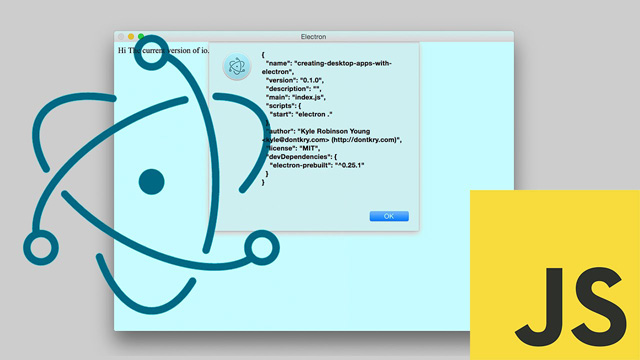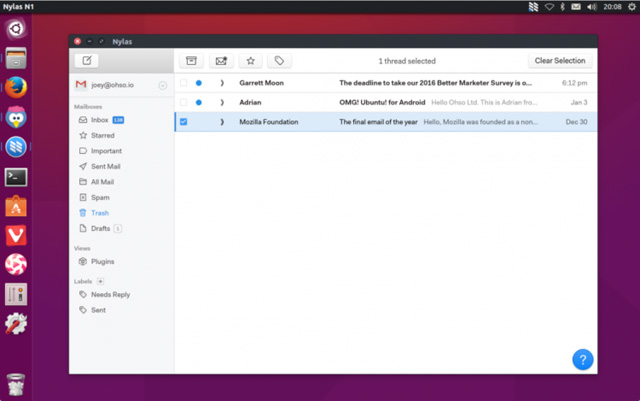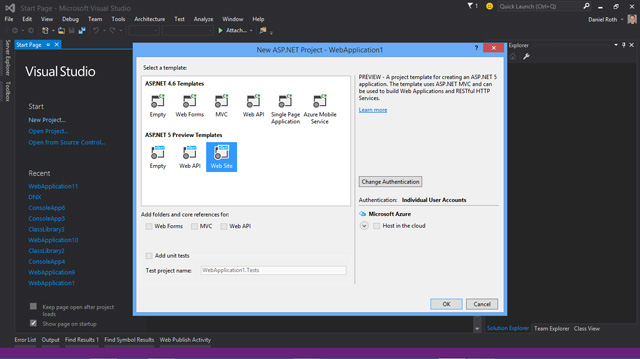After dominating the web, JavaScript began to set foot on the desktop
The coder was able to use JavaScript to increase the functionality of the web interface and set up logic for the software on the server. Now it's time for this language to set foot on the desktop.
JavaScript was born in 1995 to help your website become more interesting and colorful. Since that time, this programming language has been used in much more complex tasks. Large companies like Google and Facebook use JavaScript to build websites that work just as well as regular desktop applications. Since Node.js was released in 2009, JavaScript has also been used to build powerful software on the server.
But even the large web world is not enough for JavaScript to rampage. Thanks to Electron, JavaScript will soon become the most popular language for building a full-featured desktop application.
As a software development platform built by Github, Electron will allow programmers to use JavaScript and other basic web languages like HTML and CSS to create desktop applications that run on Windows, Linux and Mac OS X. The full version of Electron has just been released last week, but many big names have taken advantage of the platform long ago to extend the scope of JavaScript's use to the web.

For example, Microsoft's Visual Studio Code editor application is one of the first major software developed with Electron. Slack, the chat service that is causing "fever", now uses Electron to develop its desktop application. Nylas (formerly called Inbox) uses Electron to create a mail browser. Brave, the web browser built by the creator of JavaScript, Brendan Eich, also has the core of Electron.
Why is a series of large and small technology companies interested in JavaScript when they still have countless other ways to develop desktop applications? The reason is simply because of the irreplaceable position of JavaScript on the web. Since Node.js was released, many developers have figured out how to develop server applications. By the time of its release, Node.js has quickly become one of the hottest technologies in the developer world by allowing developers to develop their web experience in a comprehensive way, from application logic Use on the server to the interface on the user's web browser. The existence of a homogeneous language for both client and server obviously has a huge benefit for programmers – the next destination will obviously be the desktop.
An open platform
Electron companies are also developing open source software, allowing everyone to read and change the code. The more readers who understand the source code of a software, the less error the software has and the more feedback it receives about the feature. By using a language that has become a web-based standard, companies specializing in desktop application development can now acquire a significant stream of comments from web developers, who are not very familiar. mind the desktop background because of difficulties from traditional desktop languages like C ++.

For example, a startup called Jibo is using Electron to develop robotic virtual assistants with the aim of allowing independent developers to easily put their applications on this robot. “ We want the entry barrier to be as low as possible. So we understand from the beginning that we need to promote both game developers and web developers . ”
That is also the main reason for the existence of Electron. Initially, the software served as a platform for GitHub to develop a text editing application called Atom. GitHub founder Chris Wanstrath affirmed his desire to create this application in JavaScript so that web developers can customize it at their disposal. “ I hacked my application is one thing. But it would be really great if I could use plugins created by others . ”
On the other hand, running the application on a platform that is quite similar to the web browser will have its own disadvantages. " There will be relatively large hardware pressure when you run an Electron application , " said Ben Gotow, head of the front-end development department in Nylas. However, the trade-off here is perfectly reasonable, because Electron not only allows the coder to develop desktop applications in the "standard" language of the web platform but also allows them to choose from a library library and The huge framework that JavaScript already owns, minimizes the effort required to perform basic tasks. For example, instead of having to code back to the desktop application login feature, developers using Electron can find countless libraries that implement this feature written in JavaScript available online.

“ We can create a full email application in just one year. That's too great, ”Gotow said.
Take JavaScript to new heights
The idea of using popular web-based technologies to build desktop applications is nothing new. For example, Adobe has AIR technology that allows coder to develop desktop applications with Flash. Or, a company called Appcelerator has previously launched an application development tool with HTML and JavaScript. A project called NW.js is also a bridge for Node.js programmers to set foot on the desktop.
But at the time of 2014, GitHub's team found that web-based coder solutions on the desktop couldn't fully serve the needs of programmers. Therefore, they decided to do what all genuine engineers want to do: create their own tools and release them to the world. " We think everyone should have access to good application technology , " said Kakul Srivastava, GitHub's vice president of product development.

Jessica Lord, one of the members of the Electron team, confirmed that GitHub's tool is significantly more efficient than previous solutions. Electron comes with a minimalist version of Chromium (open source version of Google Chrome). This allows the Electron team to easily integrate new features provided by Google to avoid checking whether each new Chromium version ruins the Electron's features.
GitHub's efforts are being rewarded. The number of companies involved in the Electron project has increased to over 300 since the project began two years ago. Electron downloads have reached 1 million. However, GitHub's platform will also face strong competition from NW.js and React Native, a Facebook-developed JavaScript framework that allows the coder to build applications for all operating systems, including Windows, Xbox, iOS and Android.
But, regardless of whether the race to bring JavaScript to the desktop ends with the victory belongs to whom, the truth is that the web language has found a new home on the desktop. For users, the line between online and offline has been removed long ago. Now is the time for programmers to erase that line.
ITZone via GenK
